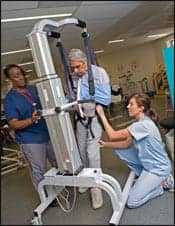Biomedical engineers from Drexel University’s school of Biomedical Engineering, Science and Health Systems will work with InfraScan Inc, a medical technology firm that specializes in brain injury diagnostics, to help upgrade a handheld brain scanning device used by the military in the field to assess injuries.
A university news story states that a group of Drexel biomedical engineers will work with the firm for the next 3 years to improve the tool, known as the Infrascanner. The device is built to save lives by detecting head injuries.
The story notes that the company recently entered into a $3.7 million contract with the research centers of the US Marine Corps and the Navy to redesign the device that they have been using since 2010 and has been commercially available since 2013. Upgrades include adding more tissue scanning capabilities and field testing protocols to help first responders diagnose and triage traumatic brain injuries (TBIs).
Baruch Ben Dor, PhD, president and CEO of InfraScan, explains in the story that initially TBIs can be “silent,” before progressing “rapidly to a life-threatening situation. Because of this, a detection and monitoring device is needed to evaluate the state of the brain well before patients start showing behavioral signs of brain damage.”
Outcomes can improve significantly if treated with an hour postinjury, known as the “golden hour,” Ben Dor notes.
Ben Dor adds that early identification of a brain hematoma, swelling, and decreasing tissue oxygen levels can play a key role in facilitating transportation of critically injured patients to facilities, which can both verify Infrascanner’s early screening and offer immediate surgical intervention.
The device is engineered to use near-infrared light to detect bleeding in the brain, and will be modified to also pick up local changes in tissue oxygenation. The story notes that the Drexel engineers, who helped program the algorithms that went into the original Infrascanner when it was developed in the early 2000s, will adjust them to also detect signs of edema.
Additionally, the story reports that Drexel engineers will help provide Infrascanner a more rugged hardware design to allow it to endure the rigorous nature of field use. The Naval Health Research Center, who has commissioned the upgrade with the US Marine Corps as the intended end user, also requested a neurological concussion evaluation exam be included with the new programming.
Banu Onaral, PhD, director of Drexel’s School of Biomedical Engineering, Science and Health Systems, articulates the university’s excitement to continue the partnership for innovation with the device: “Seeing the success of this life-saving device is a validation of our engineering research model and the work we’ve put into keeping this technology on the cutting edge,” Onaral says.
[Photo Credit: Drexel University]
[Source: Drexel University]




